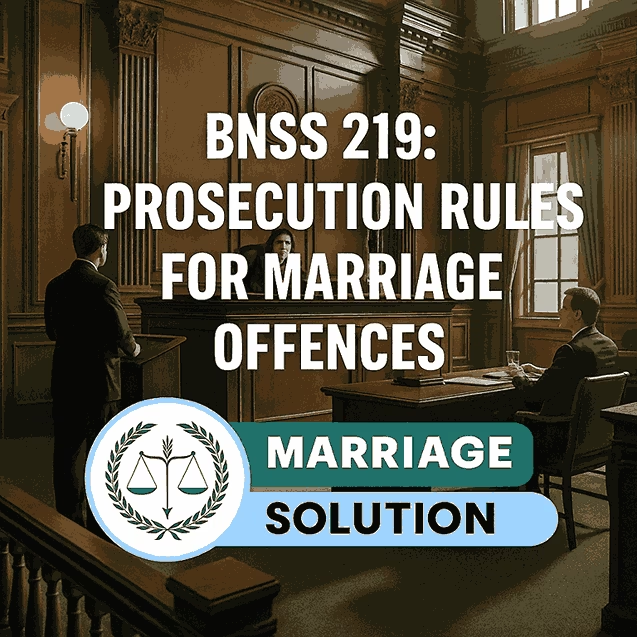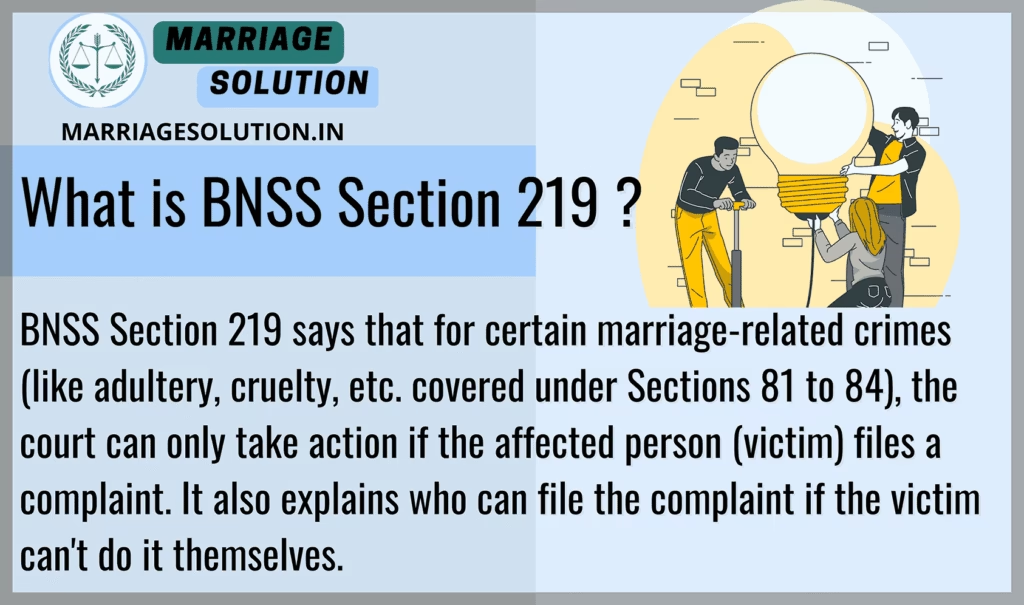Introduction to Section 219 BNSS
Section 219 BNSS of the Bharatiya Nyaya Sanhita, 2023, talks about the rules for filing legal cases related to marriage offences. It explains who can file such cases, how, and when. It gives protection to victims and prevents misuse of the law in marriage-related matters.

What is BNSS Section 219 ?
BNSS Section 219 says that for certain marriage-related crimes (like adultery, cruelty, etc. covered under Sections 81 to 84), the court can only take action if the affected person (victim) files a complaint. It also explains who can file the complaint if the victim can’t do it themselves.

BNSS Section of 219 in Simple Points
1. Only the Victim Can File the Case
In most marriage-related offences, only the person who is directly affected (usually the wife or husband) can file a complaint. No third person can go to court on their behalf unless the law allows it. This keeps the matter private and protects personal relationships.
2. Special Help for Women and Children
If the victim is a child, mentally unwell, or a woman who cannot go to court because of tradition or illness, someone else can file the case. But they need permission from the court first. This rule helps protect weak or vulnerable people.
3. No Action Without Formal Complaint
The court cannot act on its own in marriage offence cases. It needs a proper complaint from the affected person. This rule stops false cases or unnecessary legal action. It ensures justice is only given when someone truly needs it.
4. Armed Forces Member Can Authorize Someone
If the person who wants to file the case is in the Army, Navy, or Air Force and cannot come to court, they can give written permission to someone else to do it. This helps soldiers and officers get justice without leaving duty.
5. Strict Time Limit for Child Marriage Offence
If a man has sexual relations with a wife under 18, it is a crime. But the case must be filed within 1 year. After that, it is not allowed. This keeps the legal process fast and fair.
Section 219 of BNSS Overview
BNSS 219 ensures that marriage-related offences under Sections 81 to 84 are handled carefully. Only the aggrieved person (like a wife or husband) can file a complaint. The court cannot act unless the complaint is filed properly. It also includes special help for children, women, and armed forces members.
BNSS 219 – Table of 10 Key Points
1. Only the Affected Person Can File the Complaint
BNSS Section 219 says that only the person who is directly affected by the marriage-related crime can file the complaint. This means if a woman is cheated, forced, or deserted by her husband, only she has the legal right to take the matter to court. No outsider, friend, or unrelated person is allowed to complain unless permitted by law. The law respects the privacy and choice of the affected person. This rule applies to crimes like fake marriage, bigamy, desertion, or sexual offences under Sections 81 to 84 of BNSS. For example, if a woman is married under false promises, she must file the case herself. The court won’t act on general complaints. It needs a formal case by the victim.
2. Court Can’t Act Without a Formal Complaint
The court cannot take any step on its own without a written complaint from the affected person. This rule makes sure that marriage-related issues remain private and are only brought forward when truly necessary. If no one files a case, the judge cannot start the case just by hearing a rumour or news. This gives more control to the victim and avoids misuse of the law. It also protects families from unwanted interference. For example, if someone’s marriage issue becomes public but the wife doesn’t file a complaint, the court cannot do anything. Action starts only when the legal complaint is filed.
3. Help for Child or Mentally Ill Person
If the victim is a child, mentally disabled, or physically unwell, they may not be able to understand or file a complaint. In such cases, someone else can file the case, but only with special permission from the court. The court must believe that the complaint is in the best interest of the victim. For example, if a girl with mental disability is forced into marriage, her guardian or family can approach the court and ask to file the complaint. The court will check if the person filing truly cares for the victim. This helps protect vulnerable people who cannot protect themselves.
4. Support for Women Who Cannot Appear in Public
In some communities or cultures, women may not be allowed to appear in public places like courts. To help such women, BNSS 219 allows someone else to file the case on their behalf. However, they must get permission from the court before doing so. This provision ensures that women are not denied justice just because of traditional restrictions. For example, if a woman from a rural area is mistreated by her husband but cannot go to court, her brother or uncle can approach the court and seek permission to file a complaint for her. This rule balances respect for customs with justice.
5. Husband in Armed Forces Can Authorize Someone
If the husband is in the Army, Navy, or Air Force and cannot leave duty to file a complaint, he can give written permission to someone else to do it. This person must act with full knowledge of the situation. The document must be signed by the commanding officer. For example, a soldier posted on the border cannot come back quickly to file a case, so he may give his father the authority to file on his behalf. The court needs proper written proof. This helps those who serve the country to also get access to justice in personal matters.
6. Wife’s Relatives Can File in Section 82 Cases
Under Section 82 (like desertion or cruelty), if the wife is the victim and cannot file the complaint, her close relatives like parents, siblings, or even uncles can do so. However, the court must allow it. This ensures that women are not left helpless if they are abandoned, isolated, or threatened. For example, if a woman is locked up by her husband and cannot contact anyone, her mother can file a complaint with the court’s permission. This rule is very helpful in protecting women in abusive marriages when they have no way to complain themselves.
7. Only Husband Can File in Section 84 Cases
In cases under Section 84 (for example, when a woman commits bigamy or marries again without divorce), only the husband has the legal right to file the complaint. No one else can do this on his behalf, not even relatives or friends. This rule is made to protect the privacy of marriage. For example, if a wife secretly marries another man, only the original husband can go to court. This stops others from interfering in someone’s private life unless they are directly involved. It also helps maintain clarity in such sensitive legal matters.
8. Court Must Inform Legal Guardian
If a child or mentally ill person is the victim, and someone else wants to file a complaint, the court must first check whether the person already has a legal guardian. If the guardian exists, the court must inform them before allowing someone else to act. This protects the legal rights of the victim and avoids misuse. For example, if a neighbour wants to help a mentally ill girl, the court will first ask if her parents or legal guardian are available to take action. This process ensures the right person takes responsibility for the case.
9. Written Permission with Officer’s Certificate is Needed
If a person in the armed forces wants someone else to file a complaint on his behalf, he must write a letter giving permission. This letter must be signed and certified by the commanding officer to prove that it is genuine. For example, if a naval officer’s wife is harassed and he can’t come to court, he must give a written statement with his officer’s signature. The court accepts the complaint only after checking this letter. This step avoids false complaints and ensures proper legal process.
10. One-Year Time Limit for Sexual Offence with Child Wife
If a man has sexual relations with his wife who is under 18, it is a crime under the BNSS. But the complaint for this offence must be made within one year from the day it happened. If the case is filed after a year, the court may not accept it. This rule is made to prevent old and stale cases from coming to court. For example, if a girl was 17 when the offence occurred, the case must be filed before she turns 18 or within one year. This keeps the legal process quick and fair.
Example 1:
A wife is badly treated by her husband (Section 81), but she is very ill and cannot go to court. With court permission, her brother files the complaint. This is allowed under BNSS 219.
Example 2:
A husband is posted at the border in the Indian Army and cannot leave duty. He gives written permission to his friend to file a case on his behalf. This is valid under BNSS 219.
Section 219 of BNSS Short Information
| Key Point | Explanation |
|---|---|
| 1. Only Victim Can File Complaint | In marriage-related offences under Sections 81–84, only the affected person (like husband or wife) can file a complaint. Courts cannot act on their own. |
| 2. Help for Women and Minors | If the victim is a woman unable to appear in public, a child, or mentally unwell, someone else can file the case with the court’s permission. |
| 3. Armed Forces Exception | If the complainant is in the Armed Forces and can’t attend court, they can authorize someone else to file the complaint with written approval. |
| 4. Protection Against False Cases | Courts act only after a formal complaint is made, preventing misuse of the law and keeping marriage matters private and fair. |
| 5. One-Year Time Limit | If the offence involves child marriage or related sexual acts, the complaint must be filed within one year of the incident. |
BNSS Section 219 FAQs
BNSS 219
Conclusion
BNSS Section 219 ensures that only the affected person, usually the husband or wife, can file complaints in marriage-related offences like cruelty, adultery, or desertion. It protects privacy, prevents misuse of the law, and provides special provisions for minors, mentally unwell persons, and members of the armed forces. By setting a clear one-year limit for certain offences, the section promotes fairness, accountability, and timely justice in sensitive family matters.
Need Legal Support?
If you are dealing with court cases, marriage problems, or any other legal issue, our team at Marriage Solution – Lawyer Help is here for you. Simply fill out our quick online enquiry form, and we’ll connect you with the right legal expert to support your needs .
